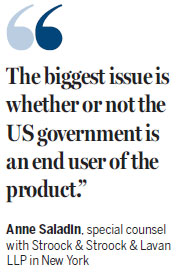Potential Micron sale eyed
Updated: 2015-07-17 11:07
By Jack Freifelder in New York(China Daily USA)
|
|||||||||
A reported $23 billion bid by China's Tsinghua Unigroup to buy US chipmaker Micron Technology Inc could have political and business impact, according to experts.
As the only US-based maker of dynamic random access memory (DRAM), any foreign takeover of Micron likely would have to pass a review by the Committee on Foreign Investment in the United States (CFIUS).
"In my experience, this is the kind of deal that CFIUS would likely want to look at because it has all the hallmarks of deals that often result in heightened scrutiny by CFIUS: It's got China, foreign government control and US high tech," said Anne Salladin, special counsel with Stroock & Stroock & Lavan LLP in New York.
Tsinghua Unigroup, a Chinese technology conglomerate, reportedly will bid $21 per share for Micron, whose shares closed down 60 cents to $18.89 on Thursday.
"The biggest issue is whether or not the US government is an end user of the product, and whether or not the product is used somehow in sensitive operations," Salladin said. "If it is high technology that is ubiquitous, it may not be something of concern. In general, the high-tech deals do get heightened scrutiny from CFIUS."
"Given the pervasiveness of semiconductor technology, there may be some technology used by the US government," Billy Vigdor, a partner in the Washington office of Vinson & Elkins LLP, e-mailed China Daily.
"With the sheer size of the transaction and the dwindling number of US microprocessor manufacturers, there may be even more interest in having CFIUS review the transaction."
Vigdor said such a review would focus on national security concerns, not economic factors.
Chinese investors were subject to 54 CFIUS reviews between 2011 and 2013, the most of any country, according to CFIUS, a committee chaired by the US Treasury secretary with representatives from 16 government agencies.
As for the industry impact, Mehdi Hosseini, a senior analyst with investment firm Susquehanna International Group, said: "Intel Corp has been trying to tap into the China market; this is why they own 20 percent of Tsinghua Unigroup.
"Tsinghua Unigroup has made investments in Hewlett-Packard's networking server business practice, and now, Unigroup is basically trying to find and identify certain technologies that would complete this data center, cloud-buildup puzzle," he said.

"Micron does offer the key building blocks for making the memory chips that are used in storing data," Hosseini said. "But Tsinghua Unigroup is not making a run for Micron as a means to get into making memory chips and driving the Korean companies out of business.
"They are doing this because DRAM and especially NAND (a flash technology) are becoming the next generation of electronics that will store data," Hosseini said. "They could dramatically reduce the cost of storing data, and it is a very critical component part of the cloud build-up."
Kevin Cassidy, a semiconductor analyst at Stifel, Nicolaus & Co, said Micron's memory chips are used in a wide range of electronic equipment, including supercomputers, data centers and defense systems, personal computers, handsets and telecom equipment.
A Chinese purchase of Micron would mean that the US "would be giving up on a technology that is critical to the advancement of computing power and productivity," he wrote to China Daily.
US Senator John McCain, an Arizona Republican, said Wednesday that he was concerned by the "potential national security implications" of a sale because Micron, based in Boise, Idaho, is the "last major American manufacturer of memory chips".
"It is critical that any proposed takeover receive careful and thorough review by the Congress, the Department of Defense, and other US government agencies," he said.
jackfreifelder@chinadailyusa.com
(China Daily USA 07/17/2015 page2)

 World's first figure 8 Ferris Wheel to be opened in Macao
World's first figure 8 Ferris Wheel to be opened in Macao
 Heavy downpour hits SW China
Heavy downpour hits SW China
 Wan Li: A life in photos
Wan Li: A life in photos
 22 World Heritage Sites in China along the Silk Road
22 World Heritage Sites in China along the Silk Road
 A day of masks
A day of masks
 France celebrates Bastille Day
France celebrates Bastille Day
 China's northernmost high-speed railway enters trial operation
China's northernmost high-speed railway enters trial operation
 Eight industries the shared economy will transform
Eight industries the shared economy will transform
Most Viewed
Editor's Picks

|

|

|

|

|

|
Today's Top News
China's GDP grows by 7%
Japan passes disputed bill
Petcoke called key in pollution fight
Service sector bolsters China’s GDP despite stock woes
Bush, Clinton dominate early presidential fundraising
Tiny Pluto sports big mountains, New Horizons finds
Greek parliament approves debt deal and first reforms
China's Internet giants reprimanded over obscene clip
US Weekly

|

|







